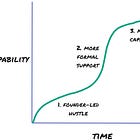How to scale energy tech
Too often, we lack informal ways for those at the frontier of tech & policy/regulation to swap notes on scaling innovation where it matters most. So last week, in collab with Eka, we hosted a small group of founders, investors and policymakers working on the energy transition. Folk from 10 Downing St., Ofgem and think tanks heard from pre/seed energy founders working on grid flexibility, domestic retrofit, and green manufacturing, while founders & investors heard the reality of how policymakers and regulators think about startups.
We’ll be convening more of these sessions in the coming months, digging into sectoral questions across health, fintech & other areas as well as operational challenges like AI product strategy, enterprise sales, and fundraising in regulated markets. We can’t guarantee spaces, but hit reply if you’d like to join 👋 and read on for a few notes we can share from the conversation.


Here’s a quick readout from the conversation:
There's a huge challenge with political imagination: startups/companies can see a radically different future ahead, but policymakers/regulators can be too focused on the past.
Part of that is due to regulators' primary focus on consumer protection and downside mitigation. E.g. Half-hourly settlement is coming to energy, but when this comes up in policy circles it can easily get caught up in a 'poor subsidising the rich' narrative, instead of 'everyone benefits, just some more than others'.
The reality of the transition is that Ofgem & the National Grid are orchestrators and actors in their own right, as well as regulators / enablers. Like it or not, regulators see startups as pieces of the jigsaw, and feel responsible for putting it together.
Put together, energy companies need to decide how much to invest in policy capability and telling their own story. On one level, there’s a risk that founders can be distracted by slow-moving policy efforts in the early days. As Greg Jackson, Octopus Energy Founder & CEO, set out in our recent interview:
As a startup, you’re a condition taker. I see a lot of startups from day one try to challenge regulation and, on the whole, there’s extremely high failure rates. If you’re dependent on changing regulation before you can actually deliver any real business, then you’re not in control of your destiny.
But some attendees on the policy side also highlighted the energy incumbents' regulatory power and encouraged startups to allocate targeted resource to offset this. But these positions aren't mutually exclusive: if, say, we have 80% of the technology required to enable the energy transition, we need to deploy that 80% asap while also unlocking the opportunity for the remaining 20%.
set out our thinking here:
At Form, we support companies to thrive within regulatory constraints and avoid distraction in the early days, but also to expand their opportunity over the long term.Ultimately policymakers, regulators and founders can align around consumers. The challenge for everyone is to adopt the mindset of households & users, to see energy from their perspective, and for startups to play incumbents' game a little more than they do today: show how innovation supports not just your company, but the system and a wider, mainstream user base beyond the energy nerds. This is particularly true as the imperatives of AI & EVs spread throughout the energy system and our centralised, fixed status quo shifts to a decentralised, flexible future.
Get in touch with any insights, suggestions or feedback, and if you’re building the future of regulated markets, in energy or elsewhere, pitch us here.







